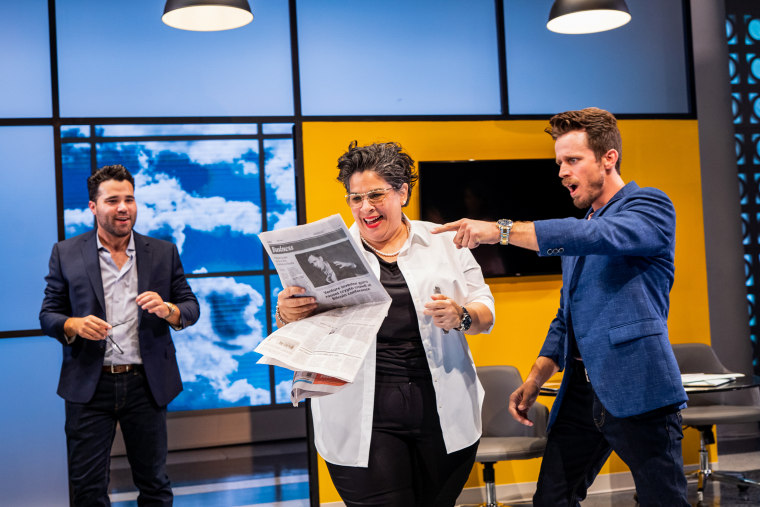MIAMI — Playwright, filmmaker, actor and activist Carmen Peláez had never taken on romance in any of her previous works.
She knows politics, though, especially in Miami, where the Latino vote in her majority Hispanic hometown has long garnered national attention.
Peláez's new play, "The Cuban Vote," involves all the elements of a typical political campaign — as well as humor and romance.
Commissioned by the Miami New Drama theater company, the work has been well-received in the city, extended a week after its original run in April at Miami Beach's iconic Colony Theatre.
When playwright and director Michel Hausmann co-founded the nonprofit Miami New Drama seven years ago, he set out to establish a theater representative of the international city's diverse population. He said many of the theaters catered to a white audience in a county that is predominantly Latino.
“Miami is more diverse than America as a whole. But America is slowly becoming more like Miami,” Hausmann, a native of Venezuela, said. “So we have a vantage point of telling the future of the American theatre.”
Written by and starring Peláez, the play is about Carolina Clarens, (Peláez) who's running for mayor of Miami-Dade County. She's very honest, but dry and straight to the point in her speeches and interviews. Alex, (played by Andhy Mendez) a political consultant from Washington, D.C., is hired to help her become more charismatic and boost her campaign.
Peláez, a Democrat who has worked on political campaigns herself, said she chose the Miami-Dade mayoral race specifically because it’s nonpartisan.
“That was important to me because the conversations around politics have got so ugly,” said Peláez, a writer who's previously contributed to NBC Latino. “There’s such a lack of dialogue that I think is eroding our democracy.”
The play's name refers to the city's large Cuban American community, an influential voting bloc in Florida that many politicians cater to during election time. The play is packed with everything you would expect from a campaign including a debate, speeches, interviews and polls. Just as in Miami, there's also plenty of Spanish heard throughout the play.
Peláez said she wanted to create a piece that was focused, “very purposely and very specifically” on the issues.
“To me, the biggest issue we face is politicking versus service. The cynical actors, versus the people that are really in it to serve,” she said.
The play touches on important issues in the sprawling city, such as the lack of affordable housing and climate change. The play folds in events that have occurred during past elections, such as candidates being labeled communist or socialist to try to pit them against Florida's Latino voters or a candidate who benefited from a "shadow candidate" with the same last name as the opponent.
Peláez garnered national attention and praise following her first solo play, "Rum & Coke," in 2008. Her second play, "Fake," dealt with the artwork of her late great-aunt Amelia Peláez, one of the best known artists from Cuba.
Despite the political appeal, the impetus for the play was the romantic comedy aspect of it. It was the first time she played a romantic lead.
“I’m a thick woman. There are very few roles for thick women that are romantic. And I wanted to see if I could do it,” she said, adding that it was “scary.”
Peláez said she is always being judged for her weight and even though she was just playing on stage, “all the hateful things that everybody has ever said,” were rolling through her head.
“You almost have to fight the lifetime of demons in order to really respect the character, which is someone that has found love and connection with another human being and has found somebody that respects her and is attracted to her for who she is and where she’s at,” she said.
For Hausmann, Peláez's play is reflective of his international, rapidly growing city.
“The work we do is work that is in conversation with our diverse, multicultural and multilingual community. We try to really go in and tell stories of those communities,” he said.
Follow NBC Latino on Facebook, Twitter and Instagram.

